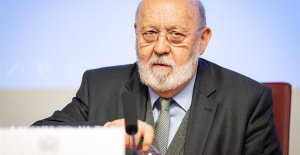He already advanced his endorsement by rejecting a draft that proposed agreeing with Vox
The Constitutional Court (TC) has rejected the PP's appeal, thus giving its definitive endorsement to decree-law 9/2021, which modifies the Workers' Statute to "guarantee the labor rights of people dedicated to delivery in the sector." of digital platforms", better known as 'rider law'.
According to legal sources consulted by Europa Press, the Plenary has endorsed by 6 votes to 4 - the progressive magistrate Juan Carlos Campo abstained in this matter - the presentation written by Ramón Sáez.
Both PP and Vox challenged the decree-law with which the Government forces it to hire delivery drivers, considering that the Executive made "abusive use" of this regulatory instrument, regardless of the importance and need of the introduced regulation.
Last September, the Constitutional Court rejected the presentation prepared by conservative magistrate Ricardo Enríquez, which defended that the extraordinary and urgent need required to regulate via decree-law did not exist, considering that the usual legal procedure could have been opted for.
The conservative magistrate chose to withdraw his text and it was decided that before reanalyzing a new presentation on Vox's appeal, that of Sáez - from the progressive wing of the TC - would be studied on the 'popular' challenge, which proposed endorsing the decree-law questioned and was accepted this Wednesday by the Plenary.
The approved sentence considers that "the Government offered an explicit and reasoned justification of the urgent need to respond to the problem of delivery workers," according to the TC.
In this sense, remember that the decree-law was approved in the middle of the pandemic, which "posed an unprecedented and unpredictable emergency situation, which gave rise to the declaration of two successive national states of alarm and which caused a rupture of the "social, economic and political normality that also affected the legislative production system."
Specifically, it emphasizes that "the crisis generated the need to define public policies for immediate response to new problems", including among those needs "the conditions of radical precariousness in which the delivery drivers of digital platform companies provided their services."
The Government justified this urgency in "the high and growing number of workers affected by the situation of job insecurity", in "the increase in the volume of services provided through digital platforms and the problems associated with this reality within the framework of the pandemic"; as well as in the post-covid economic recovery process, "to which the approved measures could contribute" by increasing the income of the 'riders' and their social contributions.
In any case, the TC clarifies that it has limited itself to carrying out the "external control" that is its responsibility and that "it must be limited to verifying, but not replacing, the political or opportunistic judgment that corresponds to the Government and the Congress of Deputies." , which can only be rejected in cases of abusive and arbitrary use."
Regarding the reproach made by the PP for the delay in the approval of the final rule, the Constitutional Court also considers that "it is justified in the tripartite social dialogue of consultation and negotiation between the Government, unions and business associations."
PRIVATE VOTE
The judges of the conservative bloc - Ricardo Enríquez, Enrique Arnaldo, Concepción Espejal and César Tolosa - have announced a dissenting vote, understanding that, although "the protection of workers and people in situations of economic vulnerability pursued by the decree -law is a laudable objective and a constitutional imperative", "it must be channeled through the channels provided for in the Constitution, not outside of them."
Thus, they emphasize "the exceptional nature of the decree-law in the system established in the Constitution, because it is a norm with the rank of law but approved by the Government and not the ordinary holder of the power to make laws, which It's Parliament."
For this reason, the four magistrates state, "the Constitution subjects its approval by the Government to strict formal and material limits, as a manifestation of the democratic principles and separation of powers." "Limits that the TC must interpret rigorously and not laxly, as the majority has done," they say.
THE 'RIDER' WERE NOT A "NEW REALITY"
In his opinion, in this case the "situation of 'extraordinary and urgent need'" does not exist. Firstly, they argue that "digital delivery platforms are not a 'new' reality, as the decree-law says, but rather they were known by the administration and the Government at least since 2015, when verifications of the Work inspection".
Consequently, they maintain that "the COVID-19 pandemic cannot be considered a new reality when the Government approved the decree-law in May 2021, no matter how much the activity of delivery drivers increased during the health crisis."
Along the same lines, they allege that "the 'Glovo' ruling of the Supreme Court of September 25, 2020, which the Government places at the origin of the decree-law, in addition to being eight months prior to its approval (in May 2021) , did not generate any 'regulatory vacuum'", as the Executive maintains.
"On the contrary, it consolidated the jurisprudence of the social order courts that since 2018 had been considering false self-employed workers who operate under the control of digital platforms as 'workers'," they point out.
Finally, they argue that "the previous action of the Government that, during those eight months of delay, established a negotiation table with the social agents and then incorporated the agreement reached at that table into the Royal Decree, is incompatible with a situation of urgent legislative reaction. law 9/2021".
"Social dialogue between representatives of workers and employers is important for the effectiveness and legitimacy of the reforms, but it does not alter the competence of Parliament to debate and approve these reforms if they need a norm with the status of law," they say.

 Exploring Cardano: Inner Workings and Advantages of this Cryptocurrency
Exploring Cardano: Inner Workings and Advantages of this Cryptocurrency Seville.- Economy.- Innova.- STSA inaugurates its new painting and sealing hangar in San Pablo, for 18 million
Seville.- Economy.- Innova.- STSA inaugurates its new painting and sealing hangar in San Pablo, for 18 million Innova.- More than 300 volunteers join the Andalucía Compromiso Digital network in one month to facilitate access to ICT
Innova.- More than 300 volunteers join the Andalucía Compromiso Digital network in one month to facilitate access to ICT Innova.-AMP.- Ayesa acquires 51% of Sadiel, which will create new technological engineering products and expand markets
Innova.-AMP.- Ayesa acquires 51% of Sadiel, which will create new technological engineering products and expand markets Puigdemont sees it possible to be invested in the second round and will not agree with PSC, PP, Vox or AC
Puigdemont sees it possible to be invested in the second round and will not agree with PSC, PP, Vox or AC The PP sees the concentration of support for Sánchez in Ferraz as a "failure" and believes that it "complicates" the story of its continuity
The PP sees the concentration of support for Sánchez in Ferraz as a "failure" and believes that it "complicates" the story of its continuity Marc Márquez returns to pole in Jerez
Marc Márquez returns to pole in Jerez The CIS carries out a quick survey on Sánchez's letter to measure the reaction of citizens
The CIS carries out a quick survey on Sánchez's letter to measure the reaction of citizens How Blockchain in being used to shape the future
How Blockchain in being used to shape the future Not just BTC and ETH: Here Are Some More Interesting Coins Worth Focusing on
Not just BTC and ETH: Here Are Some More Interesting Coins Worth Focusing on UPV students build a prototype of a wooden house to move to Equatorial Guinea
UPV students build a prototype of a wooden house to move to Equatorial Guinea The UA opens the call for the Impulso 2024 Awards for the best innovative business initiatives
The UA opens the call for the Impulso 2024 Awards for the best innovative business initiatives ALI, virtual assistant from Alicante, internationally recognized by the OECD
ALI, virtual assistant from Alicante, internationally recognized by the OECD Retrópolis brings the golden age of video games and computing to the UPV
Retrópolis brings the golden age of video games and computing to the UPV A million people demonstrate in France against Macron's pension reform
A million people demonstrate in France against Macron's pension reform Russia launches several missiles against "critical infrastructure" in the city of Zaporizhia
Russia launches several missiles against "critical infrastructure" in the city of Zaporizhia A "procession" remembers the dead of the Calabria shipwreck as bodies continue to wash up on the shore
A "procession" remembers the dead of the Calabria shipwreck as bodies continue to wash up on the shore Prison sentences handed down for three prominent Hong Kong pro-democracy activists
Prison sentences handed down for three prominent Hong Kong pro-democracy activists ETH continues to leave trading platforms, Ethereum balance on exchanges lowest in 3 years
ETH continues to leave trading platforms, Ethereum balance on exchanges lowest in 3 years Investors invest $450 million in Consensys, Ethereum incubator now valued at $7 billion
Investors invest $450 million in Consensys, Ethereum incubator now valued at $7 billion Alchemy Integrates Ethereum L2 Product Starknet to Enhance Web3 Scalability at a Price 100x Lower Than L1 Fees
Alchemy Integrates Ethereum L2 Product Starknet to Enhance Web3 Scalability at a Price 100x Lower Than L1 Fees Mining Report: Bitcoin's Electricity Consumption Declines by 25% in Q1 2022
Mining Report: Bitcoin's Electricity Consumption Declines by 25% in Q1 2022 Oil-to-Bitcoin Mining Firm Crusoe Energy Systems Raised $505 Million
Oil-to-Bitcoin Mining Firm Crusoe Energy Systems Raised $505 Million Microbt reveals the latest Bitcoin mining rigs -- Machines produce up to 126 TH/s with custom 5nm chip design
Microbt reveals the latest Bitcoin mining rigs -- Machines produce up to 126 TH/s with custom 5nm chip design Bitcoin's Mining Difficulty Hits a Lifetime High, With More Than 90% of BTC Supply Issued
Bitcoin's Mining Difficulty Hits a Lifetime High, With More Than 90% of BTC Supply Issued The Biggest Movers are Near, EOS, and RUNE during Friday's Selloff
The Biggest Movers are Near, EOS, and RUNE during Friday's Selloff Global Markets Spooked by a Hawkish Fed and Covid, Stocks and Crypto Gain After Musk Buys Twitter
Global Markets Spooked by a Hawkish Fed and Covid, Stocks and Crypto Gain After Musk Buys Twitter Bitso to offset carbon emissions from the Trading Platform's ERC20, ETH, and BTC Transactions
Bitso to offset carbon emissions from the Trading Platform's ERC20, ETH, and BTC Transactions Draftkings Announces 2022 College Hoops NFT Selection for March Madness
Draftkings Announces 2022 College Hoops NFT Selection for March Madness























